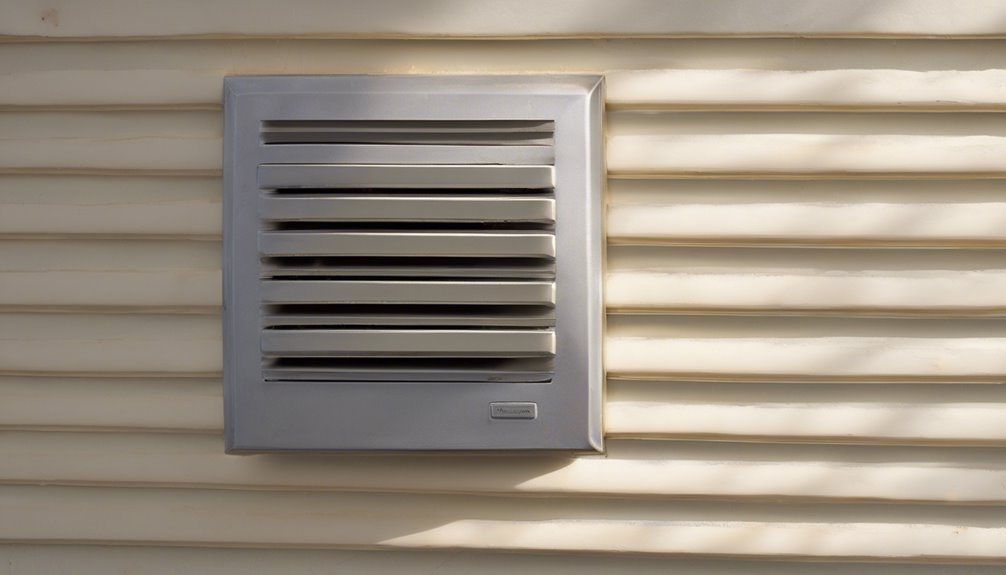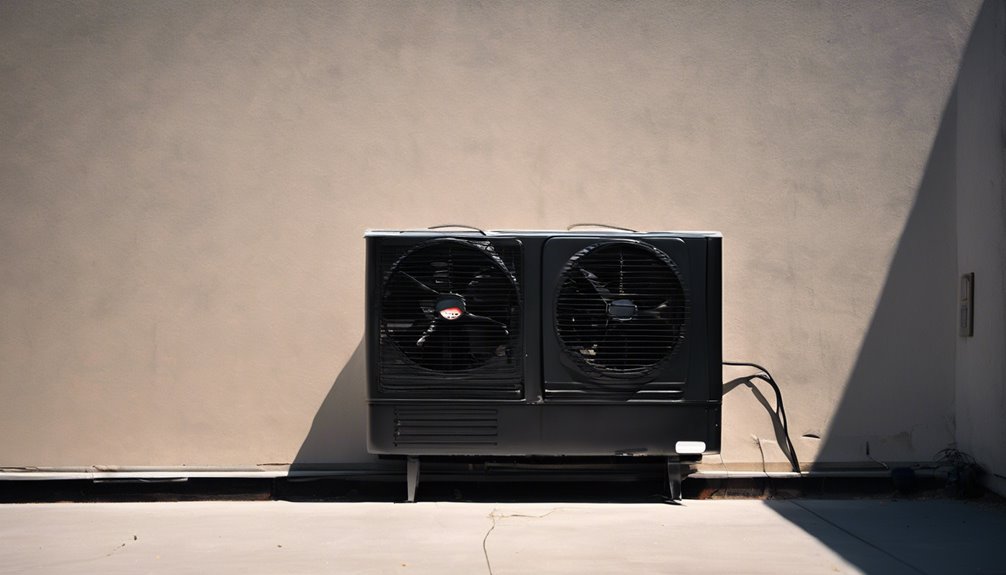"If your AC is blowing warm air, you're not alone – it's a common problem that can be caused by a range of issues. Clogged air filters, refrigerant leaks, and thermostat troubles are all potential culprits, and fixing them can be easier than you think. But there are other sneaky saboteurs that might be to blame, like frozen coils, condenser coil issues, drainage problems, and ductwork damage. Want to get to the root of the problem and start feeling cool again? Let's explore these common causes and see if we can't get your AC back on track."
Key Takeaways
- Clogged air filters, refrigerant leaks, and thermostat troubles are common causes of warm air from the AC.
- Frozen coils, dirty condenser coils, and capacitor failure can also cause the AC to blow warm air.
- Ductwork issues, such as leaks, crushing, or disconnections, can sabotage comfort and energy efficiency.
- Neglecting routine maintenance can lead to AC breakdown, while regular maintenance can prevent costly repairs.
- Regular filter maintenance, refrigerant leak checks, and coil cleaning can help prevent warm air and ensure smooth airflow.
Clogged Air Filters: The Most Common Culprit
Clogged air filters are often the root cause of an AC blowing warm air.
You mightn't realize it, but dirty filters can significantly reduce your AC's cooling performance. When you don't perform regular filter maintenance, dust and debris accumulate on the filter, blocking airflow and causing your AC to work harder.
This increases energy bills and reduces the lifespan of your unit. Check your filter monthly and replace it every 1-3 months, depending on usage.
Clean filters ensure proper airflow, allowing your AC to cool your space efficiently. By staying on top of filter maintenance, you can prevent warm air and keep your home cool and comfortable.
Refrigerant Leaks: The Silent Killer of Cool Air
Your air conditioner's refrigerant is the lifeblood of its cooling power, and even a small leak can cause your AC to blow warm air.
Refrigerant leaks can sneak up on you, causing your energy bills to skyrocket and your AC to work overtime. If you suspect a leak, it's crucial to act fast to avoid further refrigerant risks.
Don't let refrigerant leaks catch you off guard, causing skyrocketing energy bills and an overworked AC.
- Check for signs of refrigerant leaks, such as ice buildup, hissing sounds, or a sweet, pungent smell.
- Turn off your AC immediately to prevent further damage.
- Look for leak detection services that use specialized equipment to identify the source of the leak.
- Repairing the leak and recharging the refrigerant can get your AC blowing cool air again.
- Regular maintenance can help prevent leaks and ensure your AC runs efficiently.
Thermostat Troubles: When the Brain of Your AC Malfunctions
While refrigerant leaks can silently sabotage your AC's performance, another sneaky culprit can also wreak havoc on your cooling system: a malfunctioning thermostat.
As the brain of your AC, your thermostat regulates temperature and tells your system when to kick in or shut off. But when it's miscalibrated or malfunctioning, your AC can blow warm air or struggle to maintain a consistent temperature.
Temperature fluctuations can be a dead giveaway that your thermostat needs attention. Check your thermostat's calibration to ensure it's accurately reading the temperature. If you're still unsure, consider replacing it with a new one.
A faulty thermostat can lead to energy waste, increased bills, and a whole lot of discomfort.
Frozen Coils: The Chilling Truth Behind Warm Air
When you notice your AC blowing warm air, you might suspect a thermostat issue, but what if the problem lies elsewhere?
If you haven't checked your coils lately, you might be surprised to find them frozen over with ice, blocking airflow and causing your AC to malfunction.
You're about to discover how ice buildup causes this issue, the effects of coil blockage, and the defrosting solutions you need to get your AC running smoothly again.
Ice Buildup Causes
Ice buildup on your AC's coils is a common yet often overlooked issue that can cause your air conditioner to blow warm air.
When your AC's coils are frozen, it can't cool the air properly, resulting in warm air blowing from the vents. But what causes ice buildup in the first place?
- Low refrigerant levels can cause the temperature to drop, leading to ice formation on the coils.
- Dirty air filters can reduce airflow, causing the coils to freeze.
- A faulty thermostat can prevent the AC from shutting off, leading to frost accumulation.
- Leaks in the ductwork can allow warm air to seep in, causing the coils to freeze.
- Poor maintenance, such as not cleaning the condenser coils, can also contribute to ice buildup.
Coil Blockage Effects
Your air conditioner's coils are responsible for dissipating heat, but when they're blocked by ice, the entire cooling process is disrupted.
This blockage can lead to dirty coils, which reduce airflow and make your AC work harder to cool your space. As a result, your energy bills will increase, and your AC's lifespan will decrease.
Moreover, coil damage can occur when ice builds up and expands, causing coils to bend or break. This damage can be costly to repair and may even require replacing the entire coil unit.
Defrosting Solutions Needed
Now that you've identified the issue of coil blockage, it's time to take action to prevent frozen coils from disrupting your air conditioner's performance.
You need to defrost your AC coils to get cool air flowing again.
- Check your defrost timer to ensure it's working correctly.
- A faulty timer can prevent automatic defrosting.
- Look for an automatic defrost feature on your AC unit.
- This feature can detect frost buildup and defrost the coils accordingly.
- Inspect your air filter and replace it if it's dirty.
- A dirty filter can reduce airflow, causing coils to freeze.
- Ensure good airflow around your outdoor unit by keeping it clear of debris and vegetation.
- Consider upgrading to a smart thermostat that can detect frozen coils and alert you to take action.
Condenser Coil Issues: The Outdoor Unit's Role in Cooling
The outdoor unit of your air conditioner plays a crucial role in the cooling process, and its condenser coil is a critical component.
If you're not getting cool air, it's possible that your condenser coil is dirty or clogged. You should perform regular outdoor maintenance to keep it running efficiently.
Coil cleaning is essential, as dirt and debris can block airflow and reduce your AC's ability to cool. Make sure to clean the coil at least once a year, or more often if you live in a dusty or polluted area.
Dirty coils block airflow and reduce cooling power, so clean yours annually, or more often in dusty or polluted areas.
A clean condenser coil ensures that your AC can dissipate heat properly, resulting in cooler air blowing from your vents.
Drainage Problems: When Water Causes Warm Air
Clogged air conditioner drains can silently sabotage your cooling system, causing warm air to blow from your vents.
When your AC drain becomes clogged, water can't flow out, leading to condensate overflow. This can cause water damage to your system and surrounding areas, resulting in warm air blowing from your vents.
- Algae growth in the drain line
- Debris or dirt accumulation in the drain pan
- Improper installation or maintenance of the AC unit
- Failure to clean the condensate drain line regularly
- Ice buildup in the coil or drain line
Capacitor Failure: The Electrical Component That Keeps Your AC Running
You rely on your air conditioner's capacitor to keep it running smoothly, but when it fails, you're left with warm air blowing through your vents.
Capacitor failure can occur due to various reasons, including overheating, power surges, and worn-out components.
Look out for signs of malfunction, such as the AC not turning on, humming noises, or tripped circuit breakers, to identify the problem early on.
Causes of Failure
Faulty capacitors are often the culprits behind your AC blowing warm air, and it's essential to understand why they fail.
You may not be aware, but capacitor failure can be prevented with regular AC maintenance.
A capacitor's lifespan can be shortened by various factors, including:
- Loose or corroded electrical connections, which can cause the capacitor to overheat
- Voltage fluctuations, which can put excessive stress on the capacitor
- Manufacturing defects, which can lead to premature failure
- Physical damage, such as punctures or cracks, which can compromise the capacitor's integrity
- High ambient temperatures, which can accelerate the capacitor's degradation
Signs of Malfunction
When your AC's capacitor starts to malfunction, it can be a subtle but telling sign that something is amiss.
You might notice your AC blowing warm air, or it might be running constantly without cooling your space effectively. These signs can be easy to overlook, but they're crucial for AC diagnosis.
If you neglect routine maintenance, you mightn't catch capacitor failure until it's too late. Don't wait until your AC breaks down completely – keep an eye out for these signs of malfunction.
If you're unsure what's going on, it's always best to consult a professional for a proper diagnosis. By staying on top of maintenance, you can prevent costly repairs and keep your AC running smoothly all season long.
Ductwork Damage: Leaks and Blockages That Steal Your Cool Air
Air ducts, the unsung heroes of your cooling system, are prone to damage that can silently sabotage your comfort.
Air ducts, the unsung heroes, silently sabotage your comfort with hidden damage.
You mightn't even notice until your AC starts blowing warm air. Ductwork damage can lead to ventilation issues, causing your cooling system to work harder and wasting energy.
Some common ductwork damage includes:
- Leaks in joints or seams, allowing cool air to escape
- Crushed or kinked ducts, restricting airflow
- Loose or disconnected ducts, causing air to leak out
- Dirty or clogged air filters, reducing airflow
- Improperly sized or installed ducts, leading to poor ventilation
To identify these issues, consider scheduling a ductwork inspection to catch any problems before they get out of hand.
Frequently Asked Questions
Can I Fix AC Warm Air Issues on My Own?
You can try to fix AC warm air issues on your own by performing basic AC troubleshooting, like checking filters and coils, but if the problem persists, it's best to leave DIY repairs to a professional to avoid further damage.
Will a Dirty AC Filter Increase My Energy Bill?
You're likely to see a spike in your energy bill if you don't replace your dirty AC filter regularly, as it reduces filter efficiency and quality, making your unit work harder and consume more power.
How Often Should I Clean My AC Condenser Coils?
You should clean your AC condenser coils every 2-3 months, but it's essential to perform seasonal inspections to ensure optimal performance. Regular coil maintenance is crucial, so mark your calendar for quarterly cleanings to keep your AC running smoothly and efficiently.
Can I Use a Fan to Supplement My Ac's Cooling?
When summer heat hits, you can use a fan to supplement your AC's cooling, increasing personal comfort without breaking the bank. By circulating air, fans provide summer relief, allowing you to raise your AC's thermostat and save energy.
Will Turning My AC off When Not Home Save Energy?
When you're not home, turning off your AC is a great way to conserve energy and save on your bill. Try smart scheduling to automate this process, and you'll be doing your part for energy conservation while keeping costs low.
Conclusion
So, you've checked all the potential culprits and still can't figure out why your AC is blowing warm air. Don't sweat it! You've taken the first step towards fixing the problem by reading this article. Now, take action – replace those clogged filters, inspect for refrigerant leaks, and troubleshoot your thermostat. If the issue persists, it may be time to call in a pro to diagnose and fix the problem. With a little patience and persistence, you'll be back to enjoying cool, refreshing air in no time.



